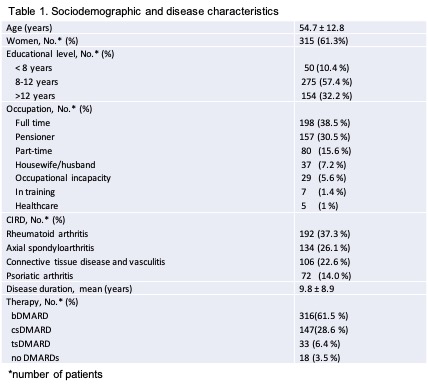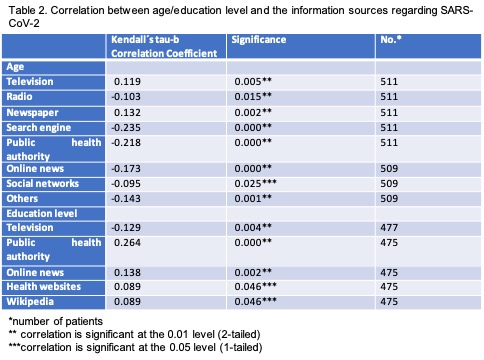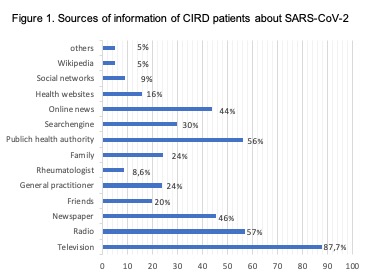Session Information
Date: Tuesday, November 9, 2021
Title: Patient Outcomes, Preferences, & Attitudes Poster IV: COVID-19 (1589–1613)
Session Type: Poster Session D
Session Time: 8:30AM-10:30AM
Background/Purpose: Patients with chronic inflammatory rheumatic diseases (CIRD) may be at increased risk of Corona Virus Disease 2019 (COVID-19).1 The quality of information obtained plays a crucial role for patients’ decision to be vaccinated. Knowing patients’ needs for information and which sources are used is important for the management of CIRD patients by rheumatologists and other physicians.
To identify main sources of information on SARS-CoV-2 used by patients with CIRD and to analyze their influence on opinions and willingness to be vaccinated.
Methods: CIRD patients presenting to our tertiary rheumatology hospital were, after informed consent, consecutively included in the study once the vaccination campaign in Germany had started, to fill out a questionnaire. Next to sociodemographic and disease-specific data, vaccination willingness and knowledge regarding SARS-CoV-2 were assessed. Furthermore, patients’ sources of information and their concerns about accuracy of information were evaluated. A numerical rating scale (NRS) ranging from 0 (completely disagree) to 10 (completely agree) was used.Values between ³7 were taken as positive answer. Nonparametric tests and multivariate linear regression analyses were performed.
Results: In early 2021, a total of 514 patients were interviewed (table 1). The majority (63.9 %) reported to be well-informed (NRS ³7), whereas 18% had doubts regarding information on SARS-CoV-2. The most often used source of information was television, and only 8.6% reported to have been informed by a rheumatologist (figure 1). About 20% of patients were no longer interested in receiving any information on SARS-CoV-2 through media. Information from rheumatologists, general practitioners, public health authorities or health related web sites did not reach 30.5% of patients. Of interest, 16% of subjectively well-informed patients were hesitant towards vaccination. As many as 43.6% of patients with doubts regarding information about SARS-CoV-2 indicated that they were not willing to be vaccinated. No source of information showed a strong correlation with SARS-CoV-2 vaccination willingness or with knowledge on SARS-CoV-2. Weak positive correlations were found between age and education level on the one hand and information sources about SARS-CoV-2 on the other hand (table 2). A weak negative correlation was found between doubts about information and health authorities, whereas positive correlations were found with social networks, friends and family.
Conclusion: Most CIRD patients think that they are well-informed about SARS-CoV-2. However, their information rarely comes from expert-based sources and rarely from rheumatologists. Thus, there is an unmet need for CIRD patients to receive appropriate and comprehensive information about SARS-CoV-2, its influence on rheumatic diseases, and about vaccination of patients with CIRD.
Reference:
1. Strangfeld A et al. Ann Rheum Dis 2021
 Table 1. Sociodemographic and disease characteristics
Table 1. Sociodemographic and disease characteristics
 Table 2. Correlation between age/education level and the information sources regarding SARS-CoV_2
Table 2. Correlation between age/education level and the information sources regarding SARS-CoV_2
 Figure 1. Sources of information of CIRD patients about SARS-CoV_2
Figure 1. Sources of information of CIRD patients about SARS-CoV_2
To cite this abstract in AMA style:
Andreica I, Roman I, Baraliakos X, Kiltz U, Braun J. Sources of Information About SARS-CoV-2 Used by Patients with Chronic Inflammatory Rheumatic Diseases (CIRD) [abstract]. Arthritis Rheumatol. 2021; 73 (suppl 9). https://acrabstracts.org/abstract/sources-of-information-about-sars-cov-2-used-by-patients-with-chronic-inflammatory-rheumatic-diseases-cird/. Accessed .« Back to ACR Convergence 2021
ACR Meeting Abstracts - https://acrabstracts.org/abstract/sources-of-information-about-sars-cov-2-used-by-patients-with-chronic-inflammatory-rheumatic-diseases-cird/
